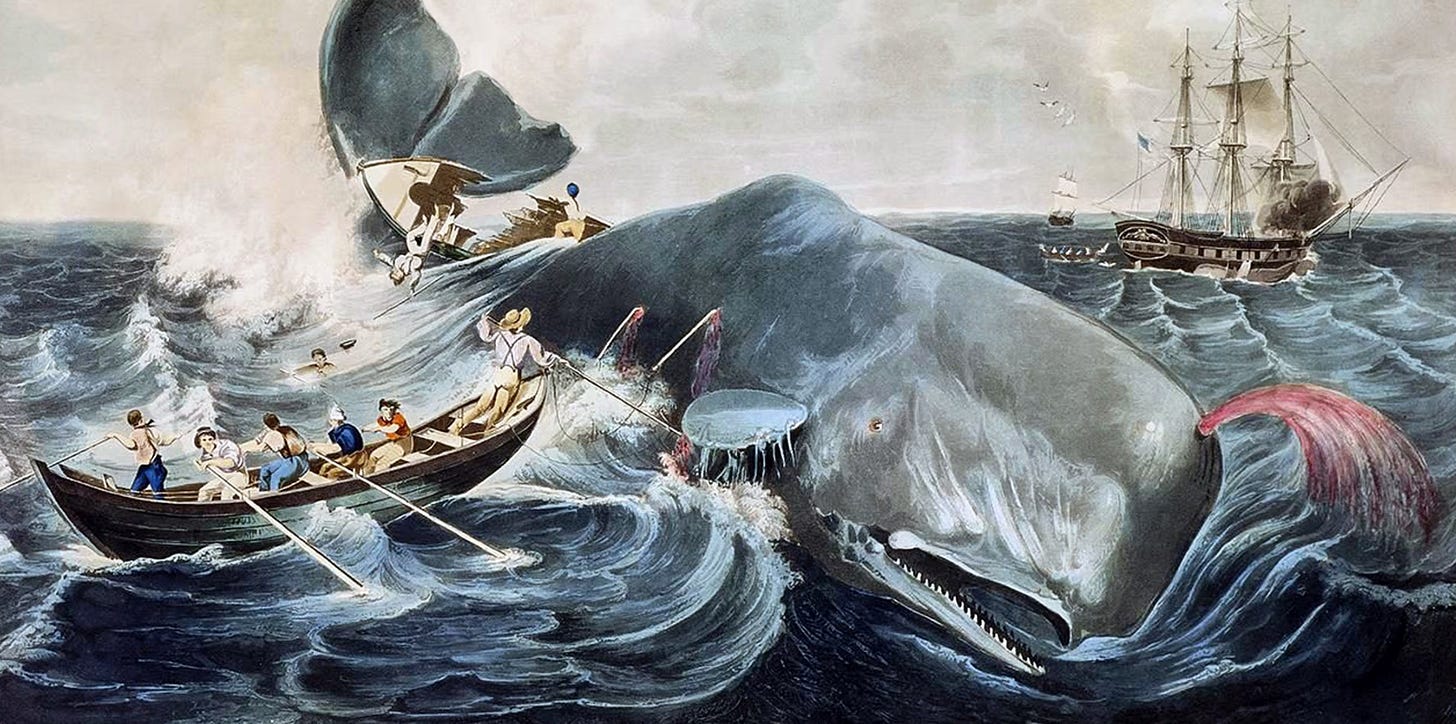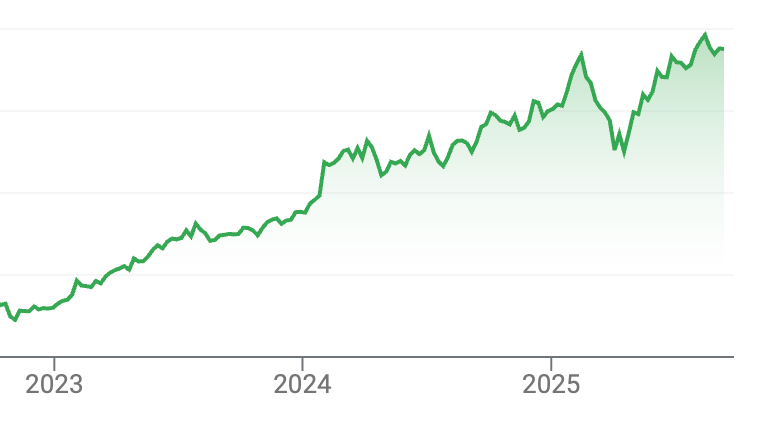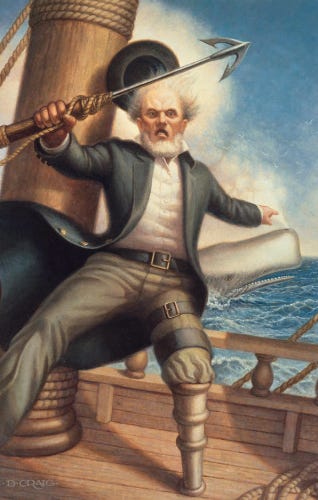Captain Ahab Had Twitter
How Melville’s mad sea captain saw evil everywhere, and how the internet trains us to do the same.
Captain Ahab never saw the world as it was, he saw it as a vast conspiracy against him. Herman Melville’s classic “Moby Dick” tells the story of a man who viewed the world through thorn rimmed glasses. The whale who took his leg wasn’t merely a wild animal doing what wild animals do, it was the embodiment of all evil. Weather events at sea weren’t just the norms of deep sea travel, they were direct attacks on him as an individual. A crew member reporting that a whale oil barrel was leaking was perceived as trying to subvert Ahab’s cosmic purpose and cause a mutiny onboard.
The Captain wasn’t chasing Moby Dick, he was chasing the man in the mirror…and that man’s own rage and obsession. The ocean and the mythical animal were nothing more than a means for Ahab to chase the ghost that was his own self validation. There was evil out there, and he’d be damned if he didn’t find the evidence to prove it.
These days, our “ocean” and “white whale” are digital. The internet offers us an endless deep blue sea of “proof” for whatever story we’ve already decided is the correct one in our heads. A way to find the evidence to support our conclusion, rather than the conclusion that is supported by our evidence. If you’ve already concluded that your political opponents are villains, you’re one Twitter search away from uncovering evidence that makes it feel undeniable. Like Ahab, we no longer search for truth. We search for confirmation.
The murder of Charlie Kirk predictably brought out this dynamic in spades, and the internet quickly morphed into the most hideous version of it’s already ugly self. As of the writing of this blog, the suspect is still at large. That of course did not stop countless people from proclaiming that “Charlie was killed by a far left nut job because of his beliefs.” This may end up being true, or it may just as easily be a sad, lonely young man who simply wanted to kill someone famous (like the Trump shooting, which I wrote about here). Or the Reagan shooting by another crazed young man who wanted to impress Jodie Foster. Seriously.
The point here is not to dive into a guns debate or a right vs left debate. We’ve been banging our head against the wall with this for years and I have nothing new to offer. If there is one thing I want to get across to you it is this: Most people are good. The internet is not real life. It is a machine that aggregates the worst version of everything and convinces you that it’s the norm. Then it harvests your outrage and anger for capital. Most people are incredibly pleasant in person, and far too many are insufferable behind the protection of a keyboard.
As the saying goes, “If you’re not paying for the product, you ARE the product.” And you are never more valuable to the platform and less valuable to yourself than when you are emotional and enraged. If you’re enraged, you’re engaged. Think back to the last time you went back and forth with someone on a Facebook thread. My guess is you weren’t trading Pozole recipes (although I got a fire Pozole recipe when I was back in Oregon last week). It was happening because you were emotional and angry, and so was the person on the other end. You both wanted the last word. You both kept messaging, the Facebook market cap kept going cha-ching, and you were both worse for the interaction.
On Wednesday, the discourse around Charlie’s death quickly turned from sadness to performative outrage. Consider the following two “conclusions” that you could come to at the time of his death on Wednesday:
-The right is outraged that “everyone on the left is celebrating this!”
-The left is outraged that “no one on the right cares when kids are killed in schools!”
The correct answer is of course that neither of these are true. But it’s never been easier to “prove” that “everyone” is doing something that fits your narrative. Go to Twitter. Type in “left celebrates Charlie’s death” or “right doesn’t care about dead kids” and you will find thousands of pieces of evidence to reinforce your already held conclusion. Some will be real, some will be bots. On a planet earth of seven billion people you will sure as hell find whatever evidence you want to support your conclusion.
This is how the algorithm works. The outrage feeds the outrage which feeds more outrage and pushes the worst version of everything to your timeline. In turn, making you believe that the version of events or opinions that you receive is the most common denominator.
And if you can find the evidence that “everyone is doing x”, you can just as easily find the “no one is talking about y.” The implication of course being that if you or I do not post on social media every day about every tragedy on earth it surely means that we do not care. “Your silence speaks volumes” might be one of the sillier social media trends of the last decade, and that is saying something.
Ahab thought he was in control of his destiny, bravely steering the Pequod toward justice against the white whale. The reality is he was consumed by it. The whale dictated his days, his speeches, his moods, and ultimately, his downfall. He thought he was the hunter, but he was in fact the hunted….by his own obsession and paranoia.
That’s the price of our “free” digital world. We think we’re scrolling for information or choosing what to watch, and ultimately deciding what to believe. Spoiler alert: We think we’re pulling the strings, but the internet is Gepetto….and we’re just Pinocchio, dancing like a court jester for someone else’s profit. The most profitable moment for the platform is the worst moment for you, and America. Each click, share, or furious comment isn’t you exercising free speech, it’s you becoming an input on a corporation’s balance sheet.
In the same way Ahab could find malice in a storm cloud or dissent in a barrel of leaking oil, we can now find infinite “evidence” online to confirm whatever suspicion we already hold. Every time we do, the algorithms take the cue to serve us more of the same. The fear isn’t merely that we’ve lost sight of truth, it’s that we no longer realize we’ve stopped being the captain of the ship.






One of your best here. Rats running around in a circle. If I’m not “engaged” then I don’t care. At the end of the day you’ve accomplished….nothing.
I’ve tried unsuccessfully to read “Moby Dick.” Maybe I’ll give it another shot. Great analogy.
Awesome article today! Way back in time my English teacher made our class read among Dick! First large book I ever read in high school. As you pointed out the struggle between man and whale was more than the struggle. Your article takes me back to that English class and how it helped me grow up! We all need to be better in this often crazy world so read Moby Dick as I am reading again after 60 plus years!
Thanks Captain Matthew